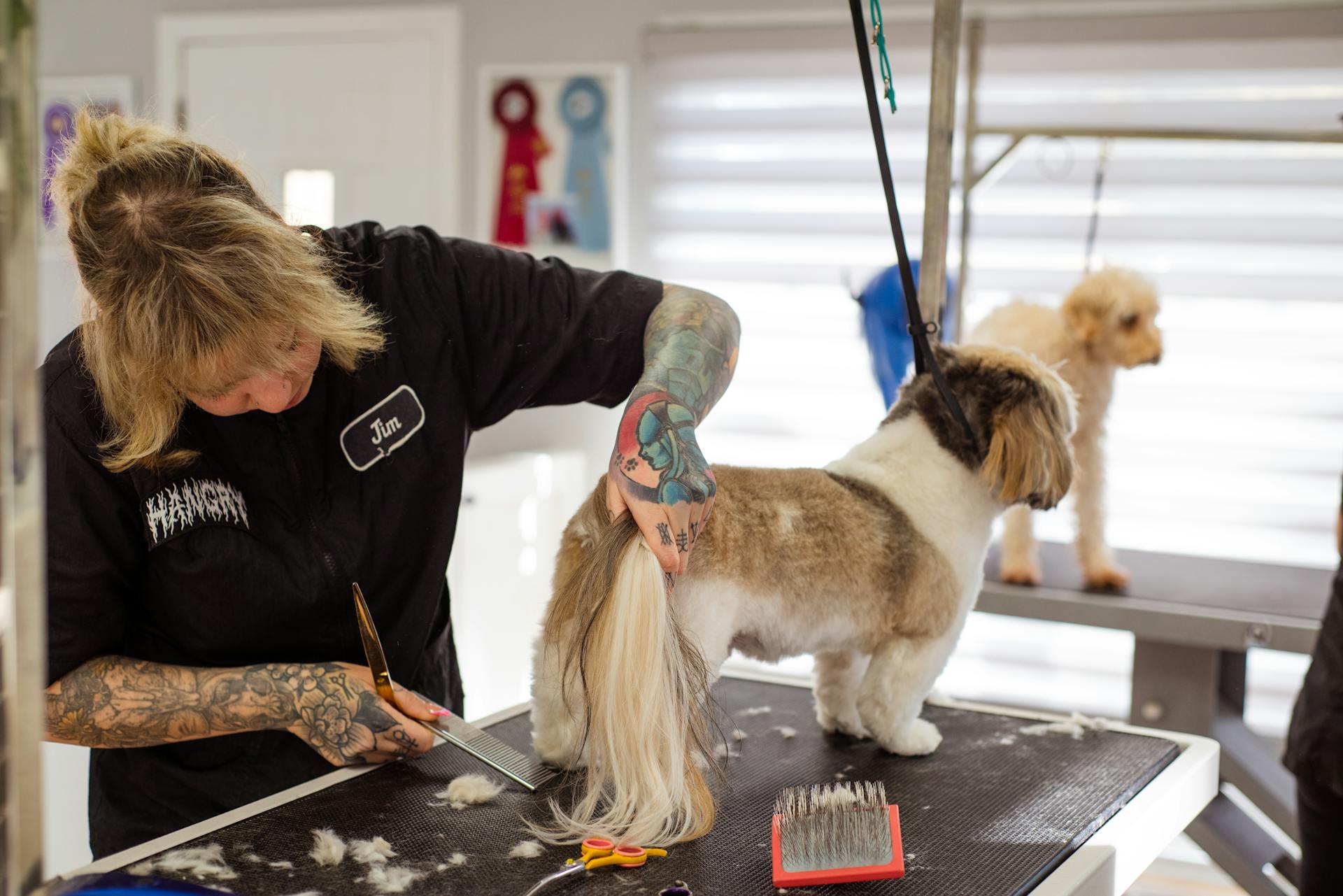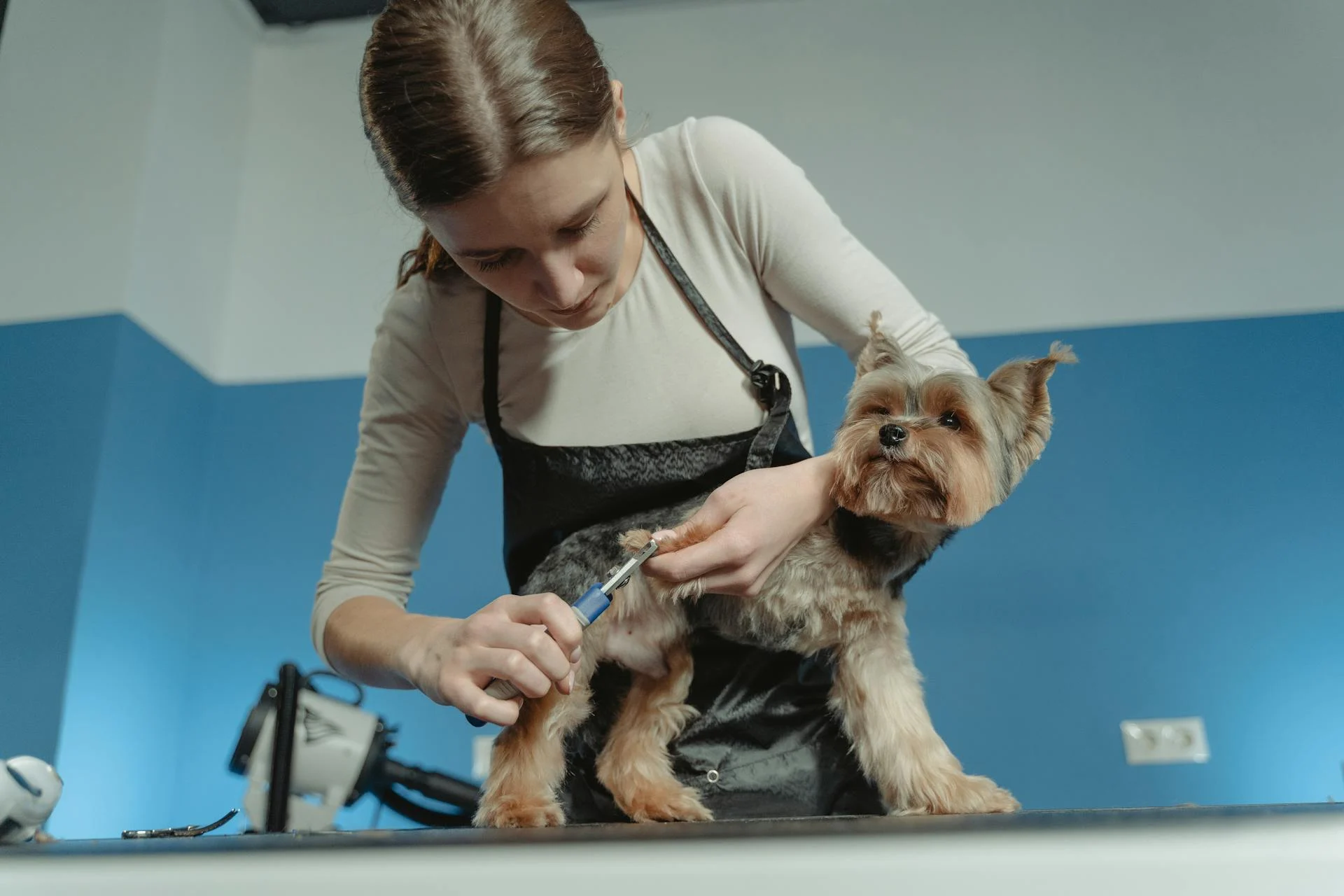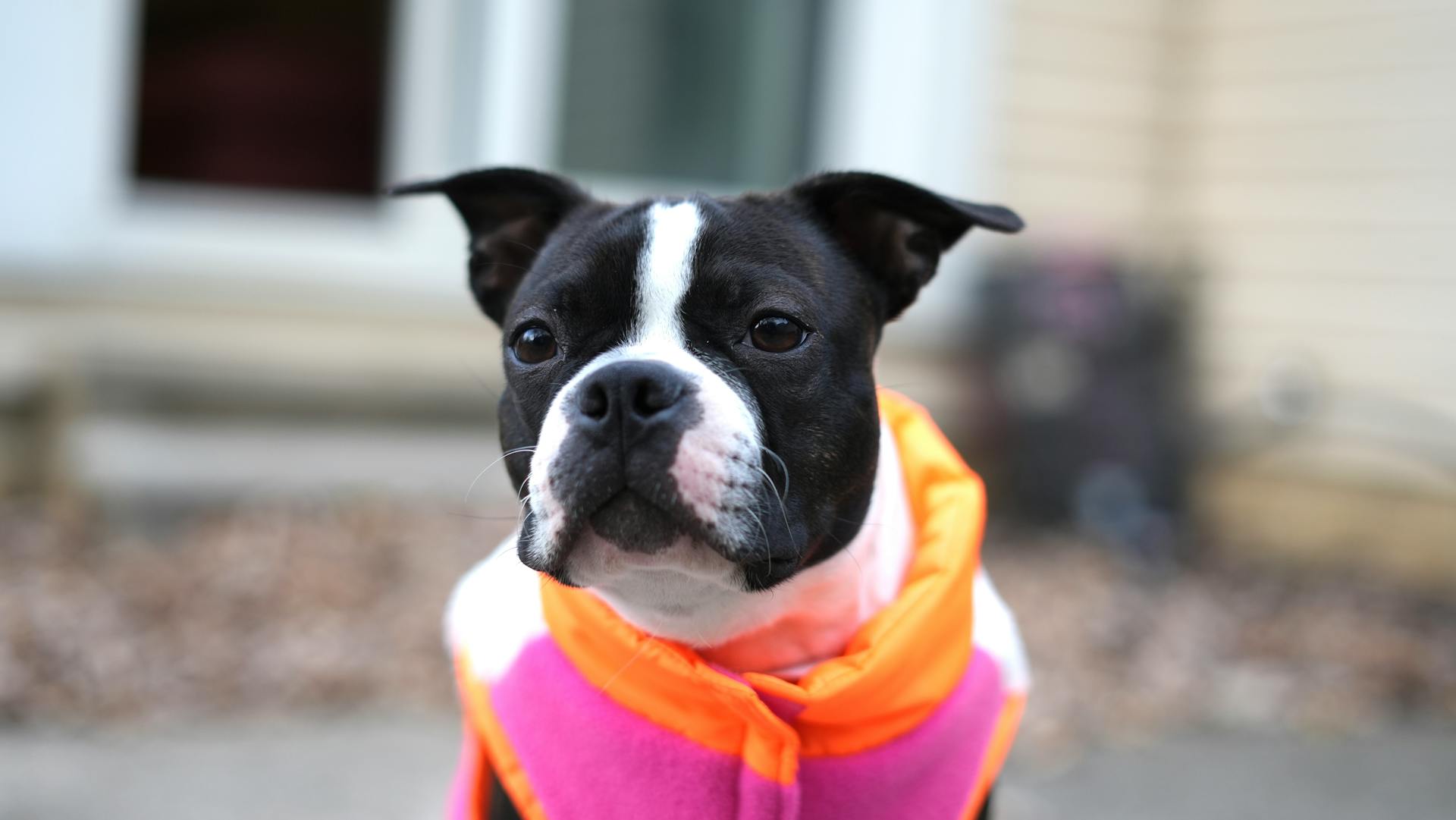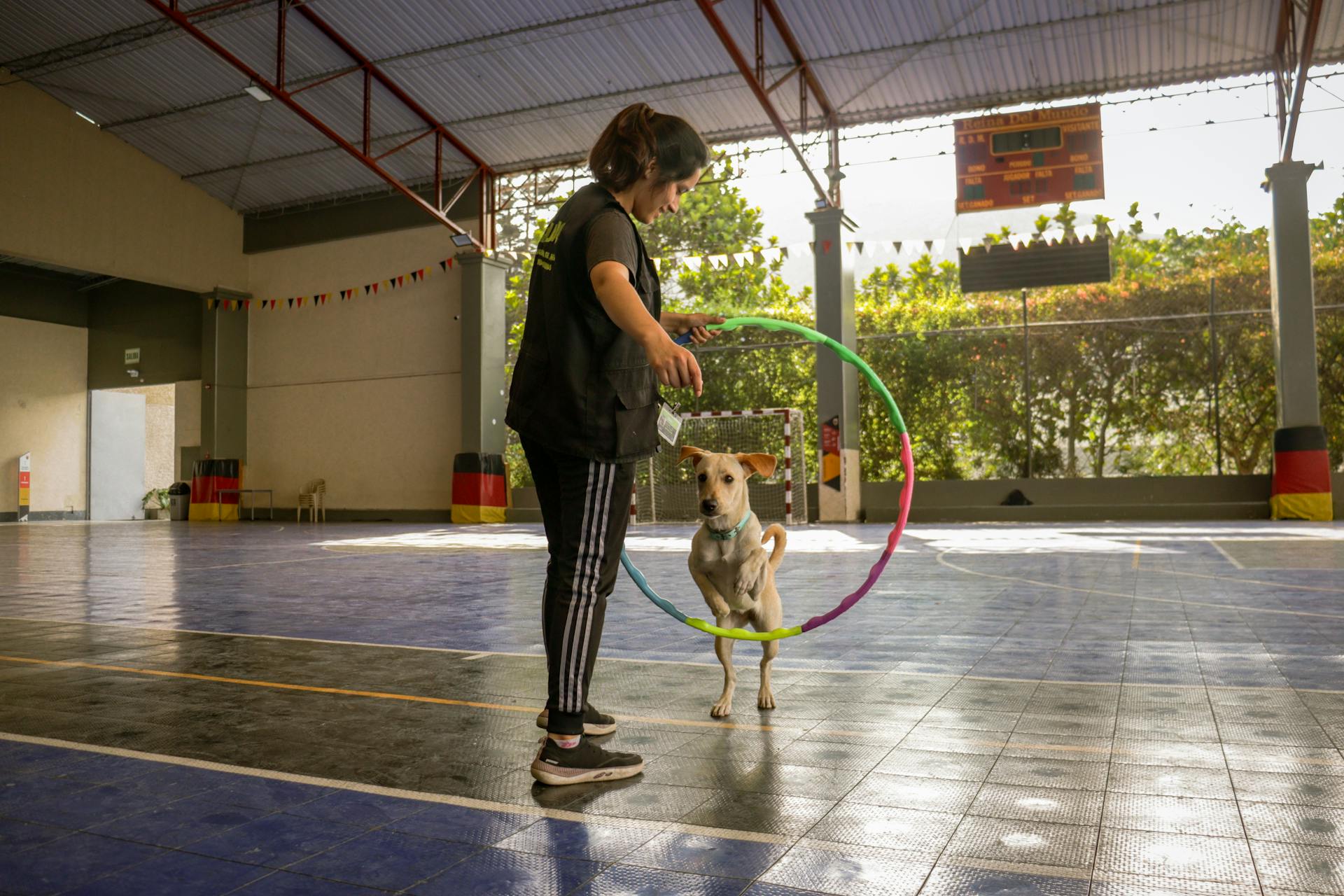
Let's get real about Goldendoodles. They're often touted as the perfect family dog, but the truth is, they're not all sunshine and rainbows.
Goldendoodles can be prone to health issues, with some breeds experiencing hip dysplasia and eye problems. Their size can also vary greatly, making it difficult to predict their adult weight and size.
Many Goldendoodles are bred with the intention of being low-shedding, but this can also mean they require regular grooming to prevent matting and tangling.
Curious to learn more? Check out: Mini Golden Doodles Size
Health Issues for Goldendoodles
Goldendoodles are generally healthy dogs, but they can be prone to certain health issues. They can live 10-15 years, but some common health conditions include heart and orthopedic conditions.
Heart disease is a major concern for goldendoodles, as it can lead to conditions like DCM, which can't be cured but can be medically managed. A vet will suggest different medications, but success varies by dog.
Hypothyroidism is another hormonal condition that affects goldendoodles, causing weight gain, lethargy, and excessive shedding. It can be medically managed with an oral thyroid replacement hormone.
Take a look at this: Do Goldendoodles Have Health Issues
Cancer is the No. 1 killer of goldendoodles, followed by heart disease and bloat. This is likely due to the fact that golden retrievers, a parent breed of the goldendoodle, are prone to these conditions.
Goldendoodles are at risk for hip dysplasia, a skin disease called sebaceous adenitis, and eye diseases like progressive retinal atrophy, cataracts, and glaucoma. These conditions can be costly to diagnose and treat, with prices ranging from $1,000 to $6,000.
To protect yourself from expensive vet bills, consider purchasing pet insurance for your goldendoodle before they show symptoms or are diagnosed.
Here's a breakdown of the estimated costs to diagnose and treat some common health issues in goldendoodles:
Reputable breeders will test their breeding stock for genetic health issues, so it's essential to ask for documentation of these tests before purchasing a puppy.
Reasons Goldendoodles May Not Be Right for You
If you're considering bringing a Goldendoodle into your family, it's essential to be aware of the potential challenges that come with owning one. Goldendoodles can have a wide range of coat types, from straight to curly, which affects their grooming needs and whether they are hypoallergenic.

Their high energy levels require significant exercise, making them unsuitable for sedentary lifestyles. They need an owner who can provide ample physical and mental stimulation.
Goldendoodles are prone to separation anxiety, which can manifest in destructive behaviors or excessive barking when left alone. This can be a challenge for owners who work long hours.
Here are the reasons why Goldendoodles might not be right for you:
- Variability in Coat Types
- High Energy Levels
- Prone to Separation Anxiety
- Regular Grooming and Maintenance
- Health Issues
- Size Variability
- Training Requirements
Allergies
Allergies can be a major concern for some families, and Goldendoodles may not be the best fit if you or a family member has severe allergies.
Goldendoodles can inherit shedding from their Poodle parent, which can trigger allergies in some people.
Some Goldendoodles may shed heavily, while others may be low shedders, but it's essential to understand that no dog is 100% hypoallergenic.
If you're allergic to dogs and considering a Goldendoodle, it's crucial to spend time with a specific dog before committing to ownership to gauge your reaction.
Many people who are allergic to dogs find that they can tolerate Goldendoodles, but it's still essential to take precautions and consider your allergy severity.
Readers also liked: Are Goldendoodles Allergic to Chicken
Not Suitable for All Families

Goldendoodles aren't suitable for every family, and it's essential to consider their unique needs. They require regular exercise to burn off their high energy levels, which can be a challenge for sedentary lifestyles.
Their high energy levels mean they need an owner who can provide ample physical and mental stimulation. This can include daily walks, playtime, and training sessions.
Goldendoodles are prone to separation anxiety, which can lead to destructive behaviors or excessive barking when left alone. This can be a problem for owners who work long hours.
Their attachment to their owners can also make them resistant to training, requiring patience and consistency. Intelligent and stubborn, Goldendoodles need positive reinforcement techniques to learn effectively.
Their grooming needs can vary greatly, depending on their coat type, which can be a challenge for those with allergies or specific preferences. Regular grooming is necessary to prevent matting and tangling, including frequent brushing and trips to a professional groomer.
Here are some specific challenges to consider:
- High energy levels
- Separation anxiety
- Variable grooming needs
- Size variability
- Training requirements
- Health issues
These challenges highlight the importance of understanding Goldendoodles' unique needs before deciding to bring one home.
Expensive

Goldendoodles can be quite expensive to care for, especially when it comes to grooming.
Their thick coats require regular brushing, which can be time-consuming and may need to be done daily.
Their large size also means they eat a lot, which can lead to higher food costs.
Some Goldendoodles may require professional grooming every 6-8 weeks, which can be costly.
Take a look at this: Grooming for Goldendoodles
Common Health Issues
Goldendoodles are generally healthy dogs, but they can be prone to certain health issues. They may develop heart conditions like DCM, which can be medically managed but not cured.
Some common health issues in Goldendoodles include hip dysplasia, a skin disease called sebaceous adenitis, and eye diseases such as progressive retinal atrophy, cataracts, and glaucoma. These conditions can be costly to diagnose and treat, with prices ranging from $1,500 to $6,000 or more.
A reputable breeder will be honest and open about health problems in the Goldendoodle and the incidence with which they occur in their lines. They should provide written documentation that the parents were cleared of health problems that affect the breed.
Autoimmune Disorders

As you care for your Goldendoodle, it's essential to be aware of the potential for autoimmune disorders. Hypothyroidism, a hormonal condition, can affect your dog's metabolism, causing weight gain, lethargy, and excessive shedding.
This condition can be medically managed with oral thyroid replacement hormone, but it's a lifelong commitment. Your vet will prescribe medication to regulate your dog's thyroid levels.
Some common health issues in Goldendoodles include hip dysplasia, subvalvular aortic stenosis, cataracts, and Addison's disease. These conditions can be costly to diagnose and treat, with estimated costs ranging from $1,000 to $6,000.
Here's a breakdown of the estimated costs for these conditions:
To protect yourself from these costly vet bills, consider purchasing pet insurance for your Goldendoodle before they show symptoms or are diagnosed.
Skin Issues
Skin Issues can be a real nuisance, causing discomfort and affecting our self-confidence. Acne is one of the most common skin issues, affecting over 80% of people at some point in their lives.

Redness and inflammation are common symptoms of acne, which can be caused by a combination of hormonal fluctuations, genetics, and environmental factors.
Dry skin is another common issue, often caused by over-washing or using harsh skincare products, affecting up to 70% of people.
Skin conditions like eczema and psoriasis can also cause dryness, itchiness, and irritation, and can be triggered by stress, allergies, or other health conditions.
Accidents
Accidents can happen to anyone, at any time, and often without warning. Falls are the leading cause of accidents in older adults, with one in four experiencing a fall each year.
The majority of falls occur in the home, with 80% of them happening on the same level, rather than from a height. This highlights the importance of maintaining a safe living environment.
Injuries from accidents can be severe, with many requiring hospitalization. In fact, the Centers for Disease Control and Prevention (CDC) report that falls are the leading cause of nonfatal injuries in older adults.

The risk of accidents increases with age, with those over 65 being more likely to experience a fall. This is often due to a combination of factors, including decreased mobility, balance issues, and underlying medical conditions.
Accidents can also be caused by environmental factors, such as slippery floors or uneven surfaces. In one study, 70% of falls were attributed to environmental hazards in the home.
No. 1 Killer of Goldendoodles
Cancer appears to be one of the main causes of death for goldendoodles, as golden retrievers are one of the main breeds known to suffer from the disease.
Heart disease and bloat are also common causes of death in goldendoodles, making them a serious concern for owners.
Unfortunately, goldendoodles are prone to cancer, which can be devastating for owners who have grown attached to their pets.
In fact, cancer is often cited as the No. 1 killer of goldendoodles, making regular veterinary check-ups and genetic testing crucial for identifying potential health issues early on.
Goldendoodle owners should also be aware of the signs of heart disease and bloat, such as rapid breathing, lethargy, and vomiting, to seek medical attention promptly if these symptoms arise.
You might enjoy: Cancer in Goldendoodles
Goldendoodle Health Issues

Goldendoodles are generally healthy dogs that can live 10–15 years, but they are prone to common health conditions of the Poodle and Golden Retriever breeds.
Cancer is a major health concern for goldendoodles, as golden retrievers are one of the main breeds known to suffer from the disease.
Heart disease and bloat are also common causes of death in goldendoodles.
Goldendoodles may develop health conditions common to both Golden Retrievers and Poodles, especially if you aren't cautious about whom you buy from.
These conditions include hip dysplasia, a skin disease called sebaceous adenitis, a heart condition called subvalvular aortic stenosis, Addison's disease, and eye diseases such as progressive retinal atrophy, cataracts, and glaucoma.
To protect yourself from the expensive vet bills associated with these conditions, you'll want to purchase pet insurance for your Goldendoodle before they show symptoms or are diagnosed.
Here are some common health issues in goldendoodles and their estimated costs to diagnose and treat:
A reputable breeder will be honest and open about health problems in the Goldendoodle and the incidence with which they occur in her lines.
Frequently Asked Questions
What is a bad behavior for a Goldendoodle?
Excessive barking and aggression, such as growling, snarling, or biting, are concerning behaviors in a Goldendoodle that may indicate stress or underlying issues
Why are doodles not good for dogs?
Doodles can be challenging due to their high energy and strong instincts, which may lead to unwanted behaviors like barking, jumping, and counter-surfing if not properly trained and managed. With consistent boundaries and positive reinforcement, however, doodles can thrive as loving and loyal companions.
Sources
- https://www.disboards.com/threads/goldendoodle-owners-tell-me-the-good-bad-and-ugly.1944429/
- https://www.forbes.com/advisor/pet-insurance/pet-care/goldendoodle-common-health-issues/
- https://iheartdogs.com/are-goldendoodles-the-worst-dog-food-for-thought/
- https://www.petmd.com/dog/breeds/goldendoodle
- https://www.embracepetinsurance.com/dog-breeds/goldendoodle-(photos)
Featured Images: pexels.com


